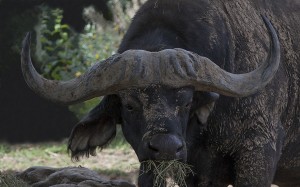I NEED TO STATE AT THE OUTSET THAT I AM A COMMITTED CONSERVATIONIST.  I trained in the field and have spent my entire adult life in the effort to maintain native biodiversity in the United States, and I continue to embrace that goal as one of the most important in my life.
I trained in the field and have spent my entire adult life in the effort to maintain native biodiversity in the United States, and I continue to embrace that goal as one of the most important in my life.
I am also a hunter. I’m not a trophy hunter. I’ve hunted big game all my life to provide healthy, organic wild meat for my family from sources close to home. I’ve never been to Africa, and I have no desire to hunt big game there. While I’m not familiar with all the details surrounding the shooting of “Cecil” the lion— and I submit that very few people have those details— I’m emphatically opposed to practices like baiting big game that dishonor the principles of fair chase and smear the reputations of all hunters.
Having said that, I’m dismayed by some of the arguments against hunting that have been made in the wake of this lion’s death. I think they threaten key elements of conservation in sub-Saharan Africa. Here are four I find particularly dangerous:
1) Much of the money paid by trophy hunters in Africa never finds its way either to conservation or to local impoverished communities.
There are corrupt regimes in sub-Saharan Africa. In these regimes, income from all kinds of sources is routinely diverted for the benefit of a ruling elite. I don’t doubt that this happens with income from the sale of hunting licenses and associated services. It also happens with income from the sale of oil, diamonds, timber, and any number of other natural resources.
I fail to see how nonresident hunters are in any way responsible for such diversions.
There are a few governments in sub-Saharan Africa that recognize the value of healthy, widely distributed game populations. In these countries, partnership between the public and private sectors has resulted in effective conservation, which includes optimum sustained yields for trophy hunters and even for commercially sold meat. Hunting is an important part of conservation funding in these nations and will probably remain so for many years.
So the problem with getting money from the First World to conservation efforts and local support in the Third World is essentially political. It nothing to do with legal hunting. And I have to add that income from ecotourism or any other source that passes through the hands of government officials in corrupt systems is no more likely to reach the common man or conservation work than the income from hunting licenses. And I suspect that government officials in such regimes are not likely to smile on programs that try to bypass government because such programs would cut into the graft that drives these systems.
2) Management agencies that are funded with income from hunting licenses inflate harvest quotas to unsustainable levels to get more money.
This accusation is frequently leveled against state wildlife agencies in the United States. I can’t speak with authority about wildlife agencies in sub-Saharan Africa, but my distant impression is that many of them are as committed to the ideal of conservation as wildlife professionals in the First World.
Wildlife biologists who manage hunting quotas in the U.S. understand all too well that game is a renewable resource. Managed properly, it yields a harvestable surplus that is never exhausted. Managed poorly, it quickly yields no surplus, and once that kind of damage has been done, the game populations may take years, even decades, to recover. Selling too many licenses in the short term means a huge loss of income in the long term. That sort of cynical overharvest not only violates the ethical canons of the profession, it significantly reduces the long-term funding for the wildlife agency.
As I say, I can’t certify that national wildlife management agencies in Africa would never knowingly overharvest a game population, but the assertion that overharvest is a necessary effect of using hunting as a source of income reflects an utter lack of knowledge, at best, or, at worst, an entrenched prejudice against hunting.
3) Ecotourism is a better approach to raising money for conservation than is well-regulated hunting. 
In the absence of an honest government, any money that flows through the hands of officials is likely to be diverted. This is just as true of money paid by ecotourists as it is of fees from hunting licenses and other permits required of hunters.
Beyond that harsh reality, there is the issue of the scale of management required to provide photographic subjects for tourists as opposed to the scale needed to produce harvestable surplus of game for hunters. The truth is that all the demands of ecotourism can be provided in a relatively small area set aside in national parks. The cost of protecting these areas is relatively low, because of their small size, and the local politics are simplified, because large areas of relatively wild country are made available for “development.”
As convenient as this approach is, it runs a grave risk of distorting or destroying huge components of entire natural systems. The migration of terrestrial ungulates is an excellent example of a natural process that is hard to contain in a small, easily managed national park. When migrations are disrupted or eliminated, predation can become a threat to confined herds, leaving park managers with the challenging puzzle of adjusting populations of various species so that they all remain in adequate numbers.
Ethical hunting, on the other hand, requires widely distributed, abundant populations of wildlife and unlike tourism, it’s a discipline that doesn’t survive crowding. Providing space for hunting requires that there be more space for wildlife. This can’t be said for ecotourism— a relatively high-quality nonhunting experience can be provided in a much smaller space than hunting demands.
The best game management takes an extensive approach to maintaining wildlife populations— managers use natural processes to encourage native forage and habitat and allow wildlife to move as it will across the landscape. This extensive approach has its own challenges, since, on the modern landscape, it often depends on the cooperation of local landholders, herders, and other residents, but it has had significant success in many places, preserving natural processes like extensive migrations, predation, and seasonal cycles in consumption of forage. It’s no accident that this extensive approach to management also benefits a wide array of nongame.
There are other, more intensive management approaches to producing harvestable surpluses of game: captive breeding of animals, providing processed feed, confining wildlife in relatively small areas. I have to say that, as a hunter, I’m not a fan of these approaches, partly because they undermine the principles of fair chase that are the foundation of ethical hunting and largely because they produce game animals without providing an adequate habitat base, which means that the animals produced are somehow less wild, and that the value of management to native nongame species is reduced.
However, even these intensive techniques support sustainable populations of game, along with many nongame species. While they aren’t the best approach to conservation, they’re far better than allowing wildlife to disappear or confining it in zoos.
I’m not belittling ecotourism as a way of supporting wildlife conservation, but I think it is naïve in the extreme to think that depending solely on ecotourism as a source of funding and political support has no consequences for free-ranging wildlife. The consequences are, in fact, profound, and at least as damaging, in their way, as well-regulated, ethical hunting.
4) Harvest of mature males is always bad for a population.
I recognize that killing a dominant male lion can have profound effects on the structure of the pride he controlled. I submit, however, that his death is inevitable and that the upheaval in pride structure is bound to occur, whether he’s shot or pulled down by younger males. Setting aside romantic illusions about the social structure among lions, I think the only practical conservation question this raises is the question that is the foundation of all conservation: What level of mortality is sustainable? Answering that question is a challenge but not an insuperable one. It requires research, data collection, and, if hunting is involved, a strict control of harvest.
The argument that trophy hunting removes the fittest males from any population neglects important realities of genetics and management. Among ungulates that grow horns, these badges of male dominance increase in size with age. Among ungulates that grow antlers, racks may dwindle when a male is extremely old, but the biggest racks still belong to males that have been sexually active for several years. Trophy ungulates are not just mature males; they are males that are practically at the end of their social and reproductive lives. The overwhelming majority of their genetic contribution to the population has already occurred.
The trophy value of large predators is judged by less obvious standards than those used to assess horned and antlered game. Still, the predator’s trophy value is generally measured by its overall size, which also relates to the animal’s age. There is a good chance that an exceptional trophy has left his genetic mark on the population. It’s also worth pointing out that sheer size isn’t a guarantee of social and reproductive dominance among predators, so the notion that killing the largest mature males in a population of big cats or bears necessarily cause problems is at least open to question.
The removal of these aging males need not have any significant effect on the genetics or social function of the population as a whole. The key to avoiding such problems is, once again, solid research and strict control of harvest. Neither of these is impossible to achieve.
The upshot
 The U.S. Fish and Wildlife Service is in the process of listing the African lion as “threatened” under the provisions of the Endangered Species Act. If that decision stands, the species will gain a large measure of protection from what is now legal hunting. I frankly doubt that a complete cessation of legal hunting will be enough to protect lions, since they face a host of other problems that have nothing whatsoever to do with trophy hunting, but there may be ethical justification for a moratorium on legal lion hunting, whether it helps lions or not.
The U.S. Fish and Wildlife Service is in the process of listing the African lion as “threatened” under the provisions of the Endangered Species Act. If that decision stands, the species will gain a large measure of protection from what is now legal hunting. I frankly doubt that a complete cessation of legal hunting will be enough to protect lions, since they face a host of other problems that have nothing whatsoever to do with trophy hunting, but there may be ethical justification for a moratorium on legal lion hunting, whether it helps lions or not.
However, I believe that a categorical end to all legal hunting of big game in Africa would be a huge mistake. Actions like Delta Airlines’ refusal to transport legally taken trophies could well prove to undermine African conservation rather than advance it.
I recognize that many people with a genuine interest in conservation find hunting repugnant. I think that view fails to credit the seminal role hunting has played in the development of our species and, at an even more fundamental level, neglects the influence predation has as a natural process that shapes much of what we find most beautiful in this world.
I won’t try to make the case for that view here, but I do want to argue a more practical point: Ethical hunting has been an irreplaceable force for conservation over the last two centuries, and it continues to be critical to the success of wildlife conservation in North America and in parts of sub-Saharan Africa with stable, ethical governments. Hunters need to police their ranks and banish people who fail to live up to the standards of the discipline. Society at large clearly has a part to play in that effort. But I counsel anyone who cares about the future of African wildlife to be careful about eliminating any approach that can help in the conservation effort, including well-regulated hunting. The most profound threats to the future of that unique fauna can be found in the economics and politics of emerging nations, not in ethical hunting. We’ll need every tool we can find to head off the loss of Africa’s free-ranging wildlife.
Leave a Reply
You must be logged in to post a comment.